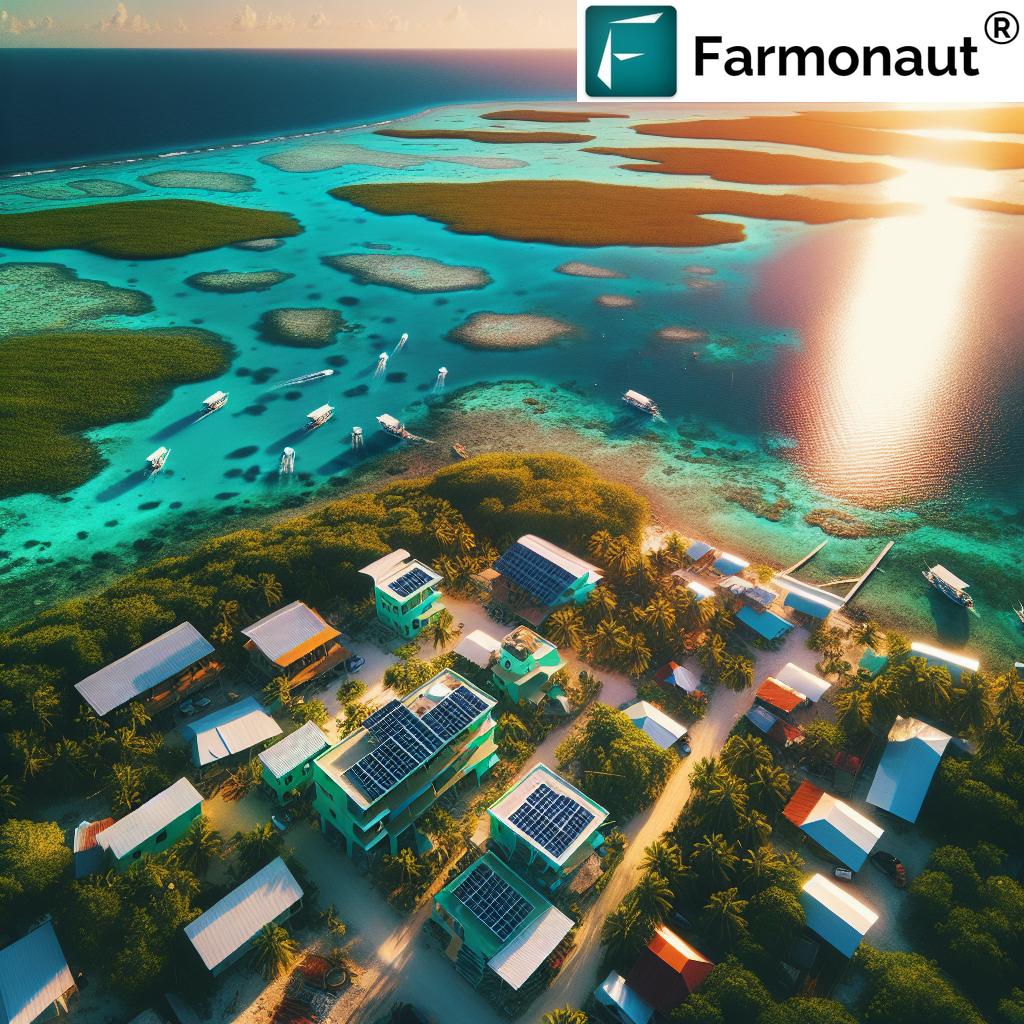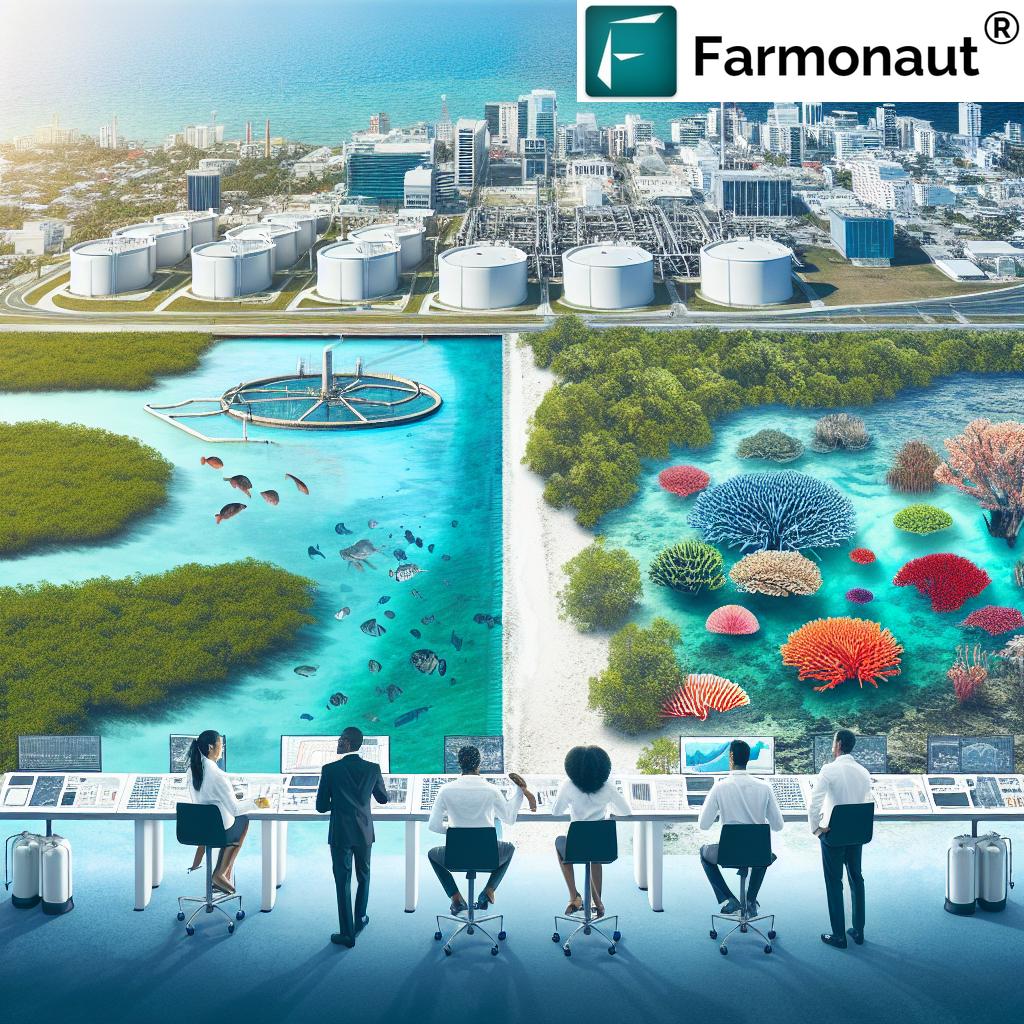Unlocking Belize’s Blue Economy: Sustainable Coastal Development for a Resilient Caribbean Future
“Belize’s US$32.23 million blue economy project aims to transform coastal development and marine resource management in the Caribbean.”
In the heart of the Caribbean, Belize is embarking on a groundbreaking journey to revolutionize its blue economy. We’re witnessing a transformative initiative that promises to reshape the nation’s approach to coastal development and marine resource management. This ambitious project, valued at US$32.23 million, is set to become a beacon of hope for sustainable growth in the region.
As we delve into the intricacies of this innovative plan, we’ll explore how Belize is poised to address critical environmental challenges while fostering economic resilience. This comprehensive strategy not only targets urban water and sanitation improvements but also champions eco-friendly tourism development and sustainable fisheries management.
The Blue Economy Revolution in Belize
The blue economy in Belize is on the cusp of a major transformation. This pioneering project is designed to enhance the management of marine and coastal resources, increase the availability of safe water, and reduce land-based pollution in strategic urban regions. It’s a holistic approach that recognizes the intricate balance between economic development and environmental conservation.

The World Bank’s approval of this project underscores its potential to serve as a model for resilience and economic development, particularly relevant to Caribbean and similar small states facing environmental and economic pressures. Lilia Burunciuc, the World Bank director for the Caribbean, emphasized the project’s significance in safeguarding Belize’s valuable natural assets while fostering sustainable growth.
Funding a Sustainable Future
The comprehensive funding for this initiative includes:
- US$23.5 million from the World Bank’s International Development Association
- US$3.76 million from the Global Environment Facility
- US$4 million from the PROBLUE multi-donor Trust Fund
- US$0.96 million from the Global Facility for Disaster Reduction and Recovery
This diverse funding pool demonstrates the international community’s commitment to supporting Belize’s sustainable development goals. The International Development Association’s contribution, in particular, highlights the global recognition of Belize’s potential as a model for sustainable coastal development.
Challenges Facing Belize’s Environment and Economy
Belize faces significant challenges to its environment and economy:
- Ranks third among small island developing states in disaster risk
- The famous barrier reef has deteriorated from a ‘fair’ to a ‘poor’ health rating
- Overfishing and habitat loss threaten marine ecosystems
- Only 71% of the population has reliable water connections
- Mere 18% benefit from sanitation services
- Over half of the population relies on agriculture and fisheries
These challenges underscore the urgent need for sustainable coastal development strategies that can protect Belize’s natural resources while supporting economic growth.
The Belize Blue Cities and Beyond Project: A Comprehensive Approach
The Belize Blue Cities and Beyond Project aims to tackle these systemic challenges through a series of strategic policy and infrastructure improvements:
- Creation of national geospatial and spatial planning frameworks
- Integration of ecological urban planning
- Implementation of nature-based solutions for sustainability
- Development of water quality control strategies
- Creation of a national sanitation master plan
- Policies for sustainable management of fisheries and marine assets
These initiatives are designed to address the root causes of environmental degradation while promoting sustainable economic growth.
Urban Investments for Sustainable Development
The project prioritizes critical urban investments in areas such as Belize City, Ambergris Caye, and Punta Gorda. These investments are crucial for promoting sustainable development in the face of climate change. Key initiatives include:
- Upgrading Belize City’s wastewater treatment plant to enhance capacity and performance
- Expanding water supply in South San Pedro
- Launching a waste management pilot project to minimize waste production and encourage source separation
- Promoting a circular economy approach to resource management
These urban investments are designed to improve the quality of life for residents while reducing environmental impact and building resilience against climate-related threats.
Carbon Market Development and Sustainable Financing
An innovative aspect of the project is its focus on carbon market development. This initiative includes:
- Creating regulatory frameworks for carbon transactions
- Developing digital infrastructure for carbon credit trading
- Enabling Belize to generate high-quality carbon credits for international markets
- Accessing sustainable financing for the blue economy
By exploring carbon market opportunities in Belize, the project aims to create new revenue streams that can support ongoing conservation and sustainable development efforts.

Building Local Capacity for Sustainable Management
To ensure inclusive development, the program focuses on building local capacity among stakeholders, including:
- Local governments
- NGOs
- Youth-led businesses
Specialized training in climate-resilient planning and gender sensitivity in managing Belize’s marine and coastal resources will be provided. This approach ensures that the benefits of the blue economy project are widely distributed and sustainable in the long term.
The Role of Technology in Sustainable Coastal Development
Advanced technologies play a crucial role in realizing Belize’s blue economy vision. Innovative solutions like those offered by Farmonaut can contribute significantly to sustainable resource management and environmental monitoring.
Farmonaut’s satellite-based farm management solutions provide valuable tools for monitoring coastal and agricultural areas. While primarily focused on agriculture, these technologies can be adapted to support:
- Coastal ecosystem health monitoring
- Land use change detection
- Water resource management
By leveraging such advanced technologies, Belize can enhance its capacity for data-driven decision-making in coastal development and resource management.
Sustainable Fisheries Management: A Key Component
Sustainable fisheries management is a critical aspect of Belize’s blue economy project. The initiative aims to:
- Implement policies for sustainable fishing practices
- Protect marine habitats essential for fish populations
- Support local fishing communities in transitioning to sustainable methods
- Develop monitoring systems to prevent overfishing
These efforts are crucial for maintaining the health of Belize’s marine ecosystems while supporting the livelihoods of communities dependent on fisheries.
Eco-friendly Tourism Development: Balancing Growth and Conservation
Eco-friendly tourism development is another key focus of the project. Belize aims to:
- Develop sustainable tourism infrastructure
- Promote responsible tourism practices
- Protect natural attractions from over-exploitation
- Create eco-tourism opportunities that benefit local communities
By focusing on eco-friendly tourism development, Belize can capitalize on its natural beauty while ensuring the long-term preservation of its ecosystems.
“Belize’s sustainable coastal development plan targets improvements in urban water, sanitation, eco-tourism, and fisheries management across multiple sectors.”
Barrier Reef Conservation: Protecting a Natural Wonder
The conservation of Belize’s barrier reef is a cornerstone of the blue economy project. Efforts include:
- Implementing strict protection measures for reef ecosystems
- Reducing land-based pollution that affects reef health
- Promoting sustainable tourism practices around reef areas
- Conducting regular monitoring and research on reef health
These conservation efforts are vital for preserving one of the world’s most remarkable marine ecosystems and a crucial economic asset for Belize.
Explore Farmonaut’s API for advanced environmental monitoring
Climate Resilience for Small States: A Model Approach
Belize’s project serves as a model for climate resilience in small states. Key aspects include:
- Integrating climate change considerations into all development plans
- Building infrastructure that can withstand extreme weather events
- Developing early warning systems for natural disasters
- Enhancing community preparedness for climate-related challenges
By focusing on climate resilience, Belize is not only protecting its own future but also providing valuable insights for other small states facing similar challenges.
Belize’s Blue Economy Project: Key Components and Impacts
| Project Component | Estimated Investment | Expected Impact |
|---|---|---|
| Wastewater Treatment Upgrade | $8 million | Improved water quality, reduced pollution in coastal areas |
| Water Supply Expansion | $6 million | Increased access to safe water for urban populations |
| Waste Management Solutions | $5 million | Reduced land-based pollution, promotion of circular economy |
| Barrier Reef Conservation | $7 million | Improved reef health, sustainable tourism growth |
| Climate-Resilient Planning | $6.23 million | Enhanced urban resilience, reduced disaster risk |
The Future of Belize’s Blue Economy
As we look to the future, Belize’s blue economy project stands as a testament to the power of sustainable development. By balancing economic growth with environmental protection, Belize is charting a course towards a resilient and prosperous future. The success of this initiative could have far-reaching implications, not just for Belize, but for coastal regions around the world facing similar challenges.
The integration of advanced technologies, sustainable practices, and community engagement creates a robust framework for long-term success. As the project unfolds, we anticipate seeing tangible improvements in water quality, ecosystem health, and economic opportunities for local communities.
Check out Farmonaut’s API Developer Docs for innovative environmental solutions
Conclusion: A Blueprint for Sustainable Coastal Development
Belize’s ambitious blue economy project represents more than just a national initiative; it’s a blueprint for sustainable coastal development that could inspire similar efforts worldwide. By addressing critical environmental challenges while promoting economic growth, Belize is demonstrating that development and conservation can go hand in hand.
As we continue to monitor the progress of this transformative project, it’s clear that the lessons learned and successes achieved in Belize will have valuable implications for other coastal nations. The blue economy in Belize is not just about preserving natural resources; it’s about creating a sustainable, resilient future for generations to come.
FAQ Section
Q: What is the blue economy?
A: The blue economy refers to the sustainable use of ocean resources for economic growth, improved livelihoods, and jobs while preserving the health of ocean ecosystems.
Q: How much is Belize investing in its blue economy project?
A: Belize is investing US$32.23 million in its blue economy project, with funding from various international sources.
Q: What are the main components of Belize’s blue economy project?
A: The main components include urban water and sanitation improvements, eco-friendly tourism development, sustainable fisheries management, and barrier reef conservation.
Q: How will this project benefit Belize’s coastal communities?
A: The project will improve water quality, enhance sustainable tourism opportunities, protect marine resources, and create new economic opportunities for coastal communities.
Q: What role does technology play in Belize’s blue economy initiative?
A: Technology plays a crucial role in monitoring coastal ecosystems, managing resources efficiently, and supporting sustainable development practices.
Earn With Farmonaut: Join our Affiliate Program
Earn 20% recurring commission with Farmonaut’s affiliate program by sharing your promo code and helping farmers save 10%. Onboard 10 Elite farmers monthly to earn a minimum of $148,000 annually—start now and grow your income!








